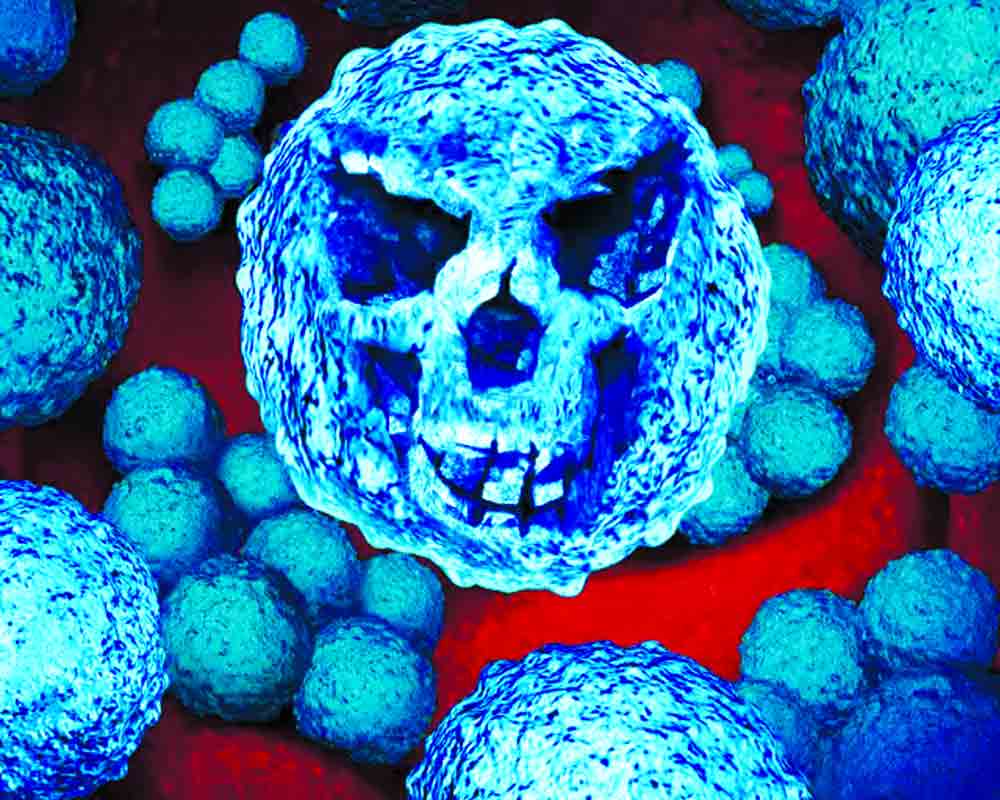The message is loud and clear, and alarming too. The antimicrobial resistance (AMR) threat is already on our doorstep. AMR occurs when bacteria, viruses, fungi, and parasites evolve and become resistant to the drugs designed to treat infections caused by these microorganisms. The consequences of failure to adequately address AMR are profound, particularly for future generations. ARCHANA JYOTI reports
What world are we going to give our children if we’ve lost all the antibiotics, and they go back to dying of a scratch they got in the garden when playing?†UK’s former Chief Medical Officer Dr. Sally Davies's message in a recent BBC documentary film serves as a stark warning about the potentially catastrophic consequences of antimicrobial resistance.
The reference to losing antibiotics, which have been a cornerstone of modern medicine for decades, underscores the potential return to a time when common infections-- from minor throat infections to serious illnesses like cholera, tuberculosis, pneumonia, etc are untreatable. This scenario would have profound implications, especially for children, a vulnerable population to day-to-day infections.
In other words, just imagine a scenario of a physician expressing an inability to treat even everyday infections relating to childbirth, surgery, and open fractured limbs which could become potentially life-threatening.
Dr. Rajesh Kumar Gupta, Additional Director, Pulmonology, Fortis Hospital, Greater Noida says he has been frequently getting infection cases where at least first-line antibiotics have become ineffective. Taking antibiotics too often or for the wrong reasons can change bacteria so much that antibiotics don't work against them, he explains and shares a case of a patient who had misused the antibiotics.
“This 60-year-old man having diabetes and high BP as co-morbidities nearly lost his life to multi-drug resistance (MDR) bacteria in his lungs. He was brought to our hospital in the emergency with a severe cough, fatigue, and difficulty breathing. His X-ray and blood tests showed that his lungs were infected with the drug-resistant bug acinetobacter baumannii.
“His medical history showed that he had been taking antibiotics OTC every time fever, cough, and body ache would retreat and rebound. After 12 days intensive treatment we managed to save him.
“He was lucky to survive but many patients are not that fortunate.â€
Dr Gupta adds that at least 70% of the AMR are community-acquired coming from sewage, poor hygiene, agriculture, and animal-related.
Dr. Sangeeta Sharma, president of the DSPRUD ( Delhi Society for Promoting Rational Use of Drugs) and Professor & Head of the Department of Neuropsychopharmacology at the Institute of Human Behaviour and Allied Sciences (IHBAS) concurs, saying, "Once a treatable infection with antimicrobial drugs, patients are grappling with life-threatening illnesses contracted during routine surgeries, cancer treatments, or therapies for chronic diseases."
People will die from infections that were once considered treatable, like urinary tract infections or strep throat.
She points out that "the overuse and misuse of these life-saving medications pose significant ethical dilemmas for healthcare professionals as they have to navigate a delicate path, aiming to provide optimal treatment without contributing to the rising tide of resistance.
“Ethical responsibility lies not only with prescribers but also with patients who must adhere to treatment plans diligently."
To address ethical and accessibility challenges, a comprehensive approach is vital. Healthcare professionals need ongoing education in responsible prescribing, while policymakers must ensure equitable access to essential medications, she added, echoing WHO's call for interdisciplinary collaboration between leaders to combat the growing global health threat of AMR.
Many patients and their families have suffered the debilitating effects of antibiotic-resistant infections. Indeed, many patients have lost their lives due to these infections, calling to address drug-resistant infections and the lack of new antibiotic development.
There are several different types of germs that have developed resistance over time.
As per doctors, the six pathogens causing the most deaths associated with resistance are Escherichia coli, Staphylococcus aureus, Klebsiella pneumoniae, Streptococcus pneumoniae, Acinetobacter baumannii, and Pseudomonas aeruginosa.
India, being one of the primary consumers of antibiotics and with its unique combination of a dense population, a significant disease burden, and diverse healthcare practices, it stands at a critical juncture in the global battle against AMR.
Over-prescription in private healthcare and resource constraints in public healthcare contribute to the development and spread of AMR, according to a 2023 study led by Dr Abhishek Sharma, (Anaesthesia), Sri Guru Ram Das Institute of Medical Sciences & Research, Amritsar. Creating awareness among people and doctors can somewhat help combat AMR.
Underscoring the need to create awareness about the issue and challenges surrounding it, the WHO has chosen the theme “Preventing Antimicrobial Resistance Together' to promote World Antimicrobial Resistance (AMR) Awareness Week, which recently concluded on November 24.
On the occasion, the Director Post Graduate Institute of Child Health (PGICH) Noida, Prof (Dr.) Arun Kumar Singh stressed on rational use of antibiotics only when prescribed by doctors. “Antibiotics only work against infections caused by bacteria. Antibiotics do not work against viruses that cause colds or the flu,†he said.
Head of Dept of Microbiology PGICH, Prof ( Dr ) Sumi Nandwani stressed on 'One Health Approach' in which all doctors, and patients, have to work as a team along with the public involved in agriculture, animals, plants, and the environment to prevent misuse of antibiotics so that our children and future generations keep winning against microbes which develop resistance to antimicrobials.
They were speaking at an event held at PGICH, Noida last week to create awareness about the health crisis staring at the humankind.
The institute’s Professor of Microbiology Dr. NP Singh highlighted the importance of hand washing, infection control, and completing the course of medicines as prescribed by doctors to prevent the development of antibiotics.
At the same time, CMS Prof Dr Mukul Jain said that since very few new antibiotics are being developed, it is important to not misuse or overuse the available arsenals.
Dean PGICH Noida Dr. DK Singh, a pediatrician sounded the alarm about the issue of AMR even in children. According to a report in The Lancet in 2022, about 1 in 5 of the estimated 1.27 million people who died from AMR in 2019 were younger than age 5. That corresponds to a young child dying from AMR nearly every two minutes.
Dr. Dinesh Kumar Tyagi, Additional Director, Internal Medicine, Fortis Hospital Greater Noida, also feels that even patients should be made aware of the risk of overuse and misuse of antibiotics.
"Antimicrobial resistance has become a cause of worry. Due to the unnecessary use of antibiotics and the fact that they're not completing their dose as prescribed by doctors, there is an increased AMR risk.
“In many western countries, only basic antibiotics are used, whereas in India, we have exposure to higher doses of antibiotics, which cause deaths in the ICU. Even animals are exposed to antibiotics, which is why when humans consume them, they suffer AMR."
Clearly, AMR has environmental dimensions also. Dr Gupta agreed as he pointed out that "the environmental dimensions of antibiotic resistance are especially critical in lower middle income countries like India. Inferior infrastructure for managing human and animal waste streams leads to greater environmental emissions of both resistant faecal bacteria and residual antibiotics, he said. China and India, as the world's largest producers of antibiotics, have reported insufficient waste management practices and excessive emissions of antibiotic residues from manufacturing."
Pharmacists are another important stakeholder in the chain who needs to take on a more active role in tackling AMR. Professor YK Gupta, Principal Advisor India at GARDP shared that doctors use antibiotics to treat a wide variety of bacterial infections. However, indiscriminate use of these life-saving drugs has led to pathogens becoming resistant over the last few decades. Well-informed pharmacists could play a crucial role in preventing the misuse of these essential drugs and help tackle AMR, which is an existing pandemic.
He was sharing his views at an event 'Pandemic of AMR: Role of Pharmacists in Preparedness,' held recently.
"This should (alarming misuse and overuse) scare everybody," said Subasree Srinivasan, GARDP's Medical Director, adding that the power of antibiotics must be preserved as the practice of modern medicine depends on them.
Srinivasan called on hospital authorities to implement antibiotic stewardship programmes that can help regulate antibiotic use by implementing evidence-based interventions. "Clinical pharmacists are central to antibiotic stewardship programmes in hospitals," noted Srinivasan.
Vijay Bhalla, Principal of SGT College of Pharmacy talked about the lack of interest among pharma firms to work in this area as resistance renders antibiotics ineffective. “Pharma firms are steering away from developing these drugs,†he informed. The WHO notes there were only 27 new antibiotics in clinical development against priority pathogens in 2021, down from 31 products in 2017.
An article in Nature speaks volumes about this dismal scenario. It notes that an estimated $1.5 billion has to be invested to develop a new antibiotic. However, the pharmaceutical firms would only gain about $46 million in annual sales of that drug. "That's tiny and nowhere near the amount needed to justify the investment," said Kasim Kutay, chief executive of Novo Holdings, Denmark, and the author of the article.
(The author is Associate Editor, The Pioneer)


























